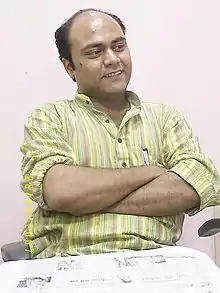Geet Chaturvedi
Geet Chaturvedi (born 27 November 1977, in Mumbai, Maharashtra) is a Hindi poet, short story author and novelist.[1] Often regarded as an avant-garde writer, he was awarded the Bharat Bhushan Agrawal Award for poetry in 2007 [2] and Krishna Pratap Award for Fiction in 2014.[3] He lives in Bhopal, India. He is active both as a fiction writer and critic. In 2011, The Indian Express included him in a list of the 'Ten Best Writers' of India.[4] His poems have been translated into seventeen languages worldwide. He translated the work of great Spanish Poet Pablo Neruda in Hindi and many others.
Geet Chaturvedi | |
|---|---|
 | |
| Born | 27 November 1977 Mumbai, India |
| Occupation | Poet, short story author, journalist and translator |
| Nationality | Indian |
| Notable awards | Bharat Bhushan Award for Poetry, Krishna Pratap Award for Fiction |
Chaturvedi is the author of seven books including the poetry collections Aalaap me girah in 2010, Nyoonatam Main in 2017, and Khushiyon Ke Guptchar in 2019. He also published two collections of novellas, Savant Anti Ki Ladkiyan and Pink Slip Daddy, in 2010. The novella "Pink Slip Daddy" was considered to be one of the best works of fiction in contemporary Hindi writing by the literary periodical Kathadesh. [5] The English translation of his novella "Simsim", translated by Anita Gopalan, won the PEN/Heim Translation Fund Grants, 2016.
Poetry
Chaturvedi was awarded the Bharat Bhushan Agrawal Award in 2007.[2] His poetry has been translated into seventeen languages.[3]
The Amphibian
His long poem Ubhaychar (The amphibian) was published in 2010, and treats topics such as memory and collective myths.[6]
Aalaap mein girah
Aalaap mein girah (Lit. Nodule in Prelude) is the first volume of his poems, published in 2010 with positive reviews.
Fiction
Aunt Savant And Her Daughters
Savant Anti Ki Ladkiyan (lit. Aunt Savant And Her Daughters), his first book of fiction, contains three novellas set in Mumbai. The common theme of the stories is women obsessed with the idea of love.
Pink Slip Daddy
Pink Slip Daddy, published in 2010, is also a collection of three novellas, "Gomutra", "Simsim", and "Pink Slip Daddy". "Gomutra" is a critique of the open market economy, in which the protagonist gets into increasingly large debts, ending with his death. "Simsim" is a love story set in a decaying library; the English translation by Anita Gopalan was awarded with the PEN/Heim Translation Fund Grants in 2016.[7] The title story is about a man called Prafful Shashikant Dadhich or PSD, nicknamed "Pink Slip Daddy".
The book received the Krishna Prataap Award for Fiction 2014. The award statement mentioned Chaturvedi's "mastery as a storyteller", and his "taut poetic language". [3]
Praise
Many senior writers and literary journals consider him one of the best writers in India. Veteran critic Namvar Singh has named him as one of the best poets and novelists of the first decade of the 21st century.[8]
While poet-critic Ashok Vajpai, in an interview, says, "Geet Chaturvedi has shown a truly avant-garde spirit in his fiction and poetry. He brings his vast reading, unusual for his generation, to bear effortlessly on his writing, which is innovative in language and style. He has an evolving vision, which is not bogged down by cliches or clutches of current ideological stances." [4]
Translation
Among the poets he has translated into Hindi, Adam Zagajewski, Bei Dao, Dunya Mikhail, Iman Mersal, Eduardo Chirinos, Adunis, Mahmoud Darwish, Pablo Neruda, Federico Garcia Lorca are to name a few.
Works
- Khushiyon Ke Guptchar. Rukh Publications, New Delhi. December 2019. ISBN 9788194312307.
- Nyoonatam Main. Rajkamal Prakashan, New Delhi. January 2017. ISBN 9788126729715.
- Aalaap mein girah. Rajkamal Prakashan, New Delhi. February 2010. ISBN 978-8126718535.
- Savant Anti Ki Ladkiyan. Rajkamal Prakashan, New Delhi. June 2010. ISBN 9788126719228.
- Pink Slip Daddy. Rajkamal Prakashan, New Delhi. June 2010. ISBN 9788126719334.
- Charlie Chaplin , A life. Samvad Prakashan. 2004.
- Chile Ke Jungalon se. Samvad Prakashan. 2004.
References
- "My body kept clanging like the tin of your house - Circumference".
- Current GK : News BBA Archived 22 May 2009 at the Wayback Machine
- "Literature Studio's Advisor Geet Chaturvedi gets Krishna Pratap Katha Samman - Literature Studio".
- "Indian Express EYE epaper dated Sun, 17 Jul 11".
- Teen Kahanikar, Ravindra Tripathi : Kathadesh (in Hindi) Archived 13 February 2010 at the Wayback Machine
- "A script waiting to explode: A hero retrieved from No Man's Land". 16 June 2010.
- "Announcing the 2016 PEN/Heim Translation Fund Winners - PEN America". 25 July 2016.
- "Pakhi".
External links
- Simsim by Geet Chaturvedi: PEN America
- Two poems by Geet Chaturvedi: World Literature Today
- Anita Gopalan's essay on translating Geet Chaturvedi
- Geet Chaturvedi's poem: Modern Poetry in Translation
- Geet Chaturvedi's poems: Poetry International Rotterdam, Translated by Anita Gopalan
- Geet Chaturvedi's blog in Hindi
- Geet Chaturvedi's poems in Hindi at Kavitakosh
- Geet Chaturvedi's Interview and two poems (English): Muse India
- Geet Chaturvedi's poems at Circumference: Poetry In Translation